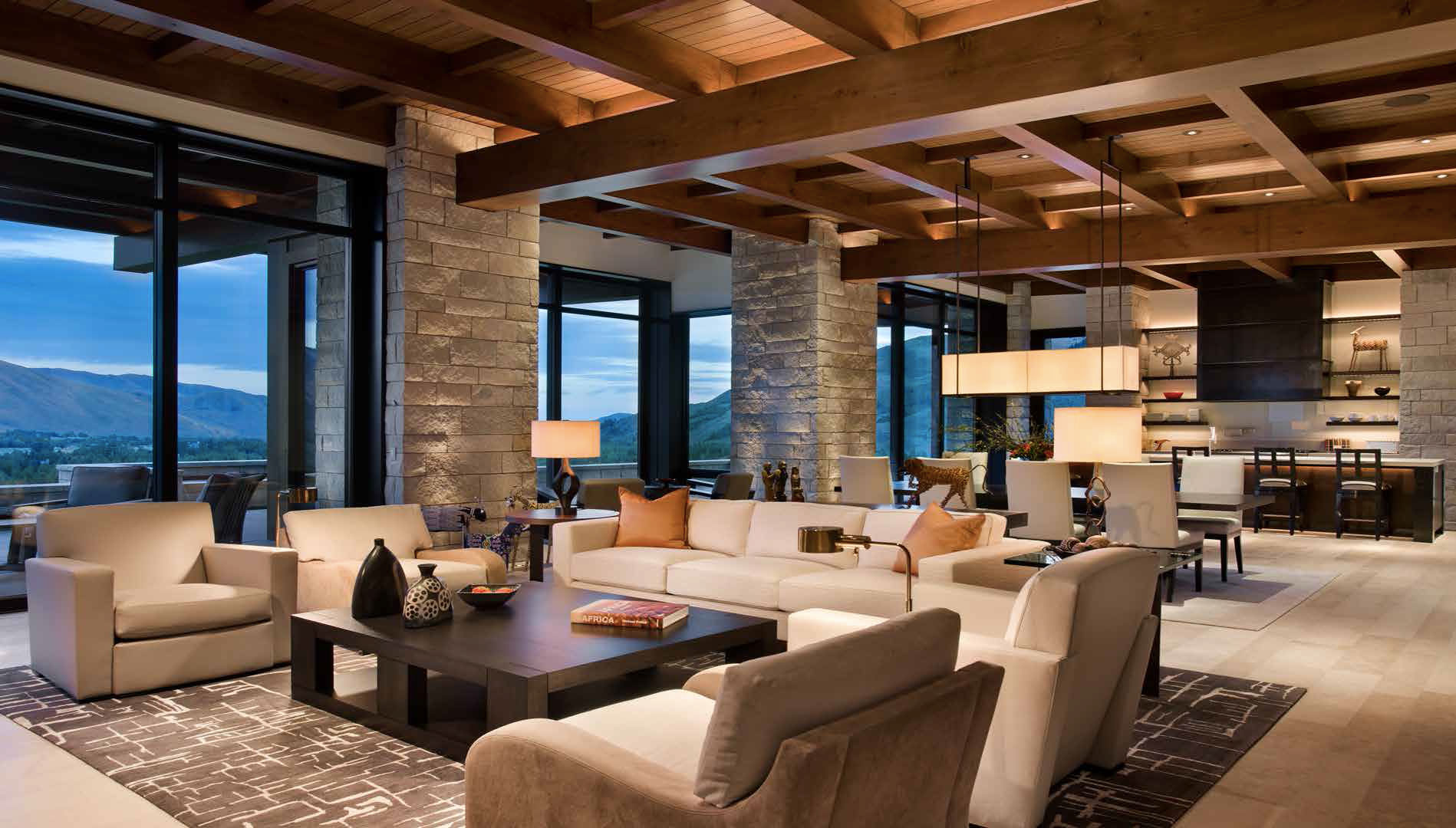BRIGHT IDEAS
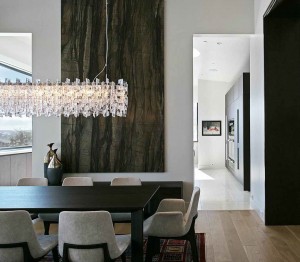
The incandescent light bulb, à la Thomas Edison—for a long time—exemplified the idea, “If it’s not broken, don’t fix it.” But there has long been a crack in incandescent technology and that crack is inefficiency. And just like Cohen suggests, a crack like that will let the light or innovation in. The need for alternatives has changed the way lighting designers and professionals approach their craft.
The incandescent bulbs that we all grew up with have very short life spans and much of the energy the bulb consumes to light the room is lost as heat. In a world where we need to pay more and more attention to our energy footprints, any improvements in the way we light our world are of note to home and business owners.
The attempts to improve or move away from the incandescent through the years have offered options, but none—until recently—gave reason enough to inspire mass migration to the new product. Alternatives to the incandescent such as the traditional and the compact fluorescent light (CFL) are not perfect replacements. Most often used in commercial spaces, fluorescent bulbs have not received the warmest of welcomes in the home. Many homeowners find the light too cold or notice a buzz or flicker generated by the bulb.
Recent years have seen the emergence of another lighting technology—the LED light or light emitting diode. LED technology has actually been around since the 1950s but the adoption of LED lighting has been slow because of the initial costs involved. Another reason consumers were slow to use the LED—we’re conditioned to think in terms of wattage and we were born and raised on the incandescent 60- or 100-watt light. Lighting designers and specialists today say that to understand LED lighting, you have to switch your thinking from wattage to lumens, the measure of luminous flux or the amount of visible light emitted by a lighting product. And you have to up your expectations. LED lights use 80 percent less energy and last 20 times longer.
“THERE IS A CRACK IN EVERYTHING.THAT’S HOW THE LIGHT GETS IN.”
–Leonard Cohen
With more research and development in LED lighting and with the consumer world warming up to using LED lighting on a larger scale, the pricing issues have all but dissipated. LEDs were initially expensive because they were new and the cost of innovation was tacked onto the price tag. Today, quality LEDs are affordable, available, and rapidly becoming the light of choice.
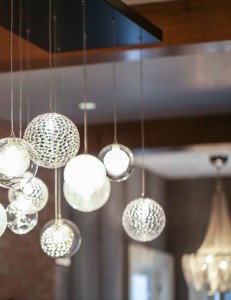
Salt Lake City-based Glenn Johnson has literally written the book on residential lighting. Residential Lighting Design, published by McGraw-Hill in 1999, includes Johnson’s insights on the art of lighting. Born into the lighting world, Johnson learned at the knee of his father who developed the Merlin Light®, a leading illumination system for the country’s finest art collections. Founder of Adaptive Design Group, Johnson has added his own innovations to the lighting world; he developed and trademarked The ADAPTIVE Method®, a process of layering lighting that has been embraced by lighting designers, architects, and discriminating homeowners nationwide. In addition, Johnson’s Adaptive Design Group, Inc. provides world-class architectural lighting design, lighting controls, and electronic systems engineering for custom home and resort properties.
According to Johnson, “The ADAPTIVE Method® articulates eight layers of lighting that can (and should) be applied to the built environment.” Johnson posits that each layer—Architectural, Decorative, Art, Path, Task, Interior Decoration, View, and Exterior—can be thoughtfully combined to create the best impact. Think about your favorite residences, your favorite interiors and you’re sure to see these eight layers at work.
“LED LIGHTING HAS, OF COURSE, ROCKED ALL OUR WORLDS THESE PAST FEW YEARS.”
–Glenn Johnson, Adaptive Lighting
Johnson says you cannot overstate the impact that LED technology has had on lighting design. “LED lighting has, of course, rocked all of our worlds these past few years. But I shied away from specifying ‘point-source’ LED lamps until this year. 25- to 40,000-hour lamp life is wonderful, but those original LED lamps were not the best quality of light. LED is now ready and can be dimmed successfully under certain conditions. By far, LED lighting and its controlling technologies (drivers and dimmers) have been the most significant paradigm shift in my 35-year career in lighting.”
Elume, a Park City-based boutique lighting showroom, is driven to inspire its clients when it comes to lighting. Understanding the need to intentionally layer and thoughtfully light a home or business, the team at Elume should be a homeowner’s first stop when thinking of making changes to their lighting.
Co-owner Jennifer Brassey says, “The Elume team works with architects, contractors, designers, and homeowners. It is important to be part of the construction “team” early in the process; lighting is so important because it defines the space and creates a mood for the occupants. It can make or break a project!”
To stay up on all the current trends and technological advances in lighting, the Elume team hits the road annually. Brassey says, “Every one of Elume’s lighting consultants is passionate about lighting and competent in industry technology and trends. Twice a year the entire team visits the Dallas Lighting Show to see the latest fixtures and advancements.”
“LIGHTING IS SO IMPORTANT BECAUSE IT DEFINES THE SPACE AND CREATES A MOOD FOR THE OCCUPANTS, IT CAN MAKE OR BREAK A PROJECT.”
–Jennifer Brassey, Elume Distinctive Lighting
Why should homeowners pay such close attention to lighting—or at least hire consultants like Elume to guide them in their lighting choices? Brassey says, “Lighting is an investment, like art, and it should be displayed and admired!”
A LED-lighting design and manufacturing company with a nine-year history in LED and fiber-optic lighting, Eugene, Oregon’s ImagiLux specializes in LED-lit decorative panels that are very much in demand. According to John Darland, founder of ImagiLux, the commercial world was quick to catch on to the advantages of these decorative panels. From backlit commercial displays to stained glass panels and backlit panels for fine art, ImagiLux can customize LED panels to any specification.
Luxury motorcoach and elevator cab manufacturers, wine cellar designers—and more and more residential architects and interior designers are using ImagiLux’s products and services. Darland says, “Companies integrate our panels into exclusive designs that make the most of a small space. The list goes on, and residential applications are the next front that is opening up—particularly with backlit onyx in kitchens and bathrooms. We can’t wait to see what kind of projects are coming up in 2016.”
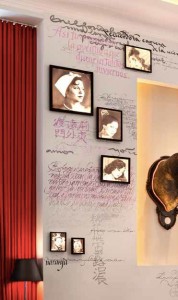
In the residential world, according to Darland, “ImagiLux panels are most often used to backlight onyx or other translucent stone, glass tiles, architectural resin, or glass. We’ve designed panels for countertops, islands, backsplashes, walls, fireplace surrounds, and floor tiles.” And homeowners are seeing these panels and another avenue to make a mark on their homes. Darland and his team at ImagiLux are prepared to walk anyone through the process, no matter their level of familiarity with the technology and the possibilities. The ImagiLux team specializes in helping clients understand the options and the steps to creating a final product that is unique to their homes and reflective of how they live and who they are.
For everyday lighting, Rocky Mountain Hardware, an Idaho-based company specializing in hardware, plumbing, and lighting fixtures, approaches all of their designs through the lens of utility and beauty—a winning combination. For their lighting line, certainly the first priority is function—lighting a room. But the designs they offer are artistic, stylish, and versatile. From sconces to custom, RMH’s designs not only complement the interiors, they shine.
The versatility of the RMH collections is key, says Christian Nickum of Rocky Mountain Hardware. “When we design new product, we want to make sure that our designs work with a variety of interior styles. We also work with interior designers to create custom creations specific to the needs of particular clients.”
Designers and lighting professionals are adept at harnessing the ever-improving lighting technologies to make an impact in the commercial and residential worlds. As Darland says, “Creative, thoughtful lighting can make an ordinary space extraordinary.”
“IMAGILUX PANELS ARE MOST OFTEN USED TO BACKLIGHT ONYX OR OTHER TRANSLUCENT STONE, GLASS TILES, ARCHITECTURAL RESIN, OR GLASS.”
–John Darland, ImagiLux
LIGHTING SPECIAL OCCASIONS
Brite Nites is a lighting company in the Salt Lake City-area that handles landscape, bistro/patio, holiday, contour, and RGB lighting needs for commercial and residential clients. Dean Lyons founded the company in 1993 as he drove around in his yellow Jeep with a single ladder hanging holiday lights. The scene created such a buzz, clients started calling to inquire and a year-round lighting design and decor business was born. WHJ talks to founder, Dean Lyons, about his business and his passion for lighting.
From Brite Nite’s humble beginnings, you have built a successful business around accessorizing the home with lights. Can you speak to the demand you see out there for quality, creative, and unique lighting?
There is definitely a desire
for high-quality Christmas lighting. At the same time, we have seen many clients, both residential and commercial, who are interested in a large holiday display. From 20’ reindeer to spinning dreidels, Brite Nites has done it all. And we love every second of it!
How has technology changed the work you do in the past few years?
Many people will recognize the switch from incandescent to LED. LED lights are a huge improvement, and they are definitely recommended over incandescent lights. LEDs are much more energy-efficient and last much longer than incandescent lights. We’re now seeing a big interest in permanent RGB lighting as well, though. These lights are perfect because you can change the color or pattern with just the click of a button. No matter the occasion, RGB lights allow your home to be the life of the party.
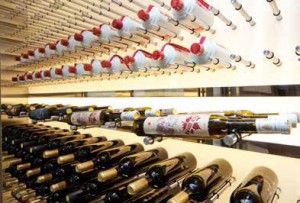
Do you have any favorite projects—what made these projects special?
We just finished decorating both the interior and the exterior of the Montage
for Christmas, which was absolutely stunning.The landscape lighting you do amplifies architectural elements. Could you describe your process for this sort of lighting?
We always begin with a consultation with a member of our design team. They are trained to provide accurate estimates, meet budgets, and provide creative lighting solutions. After the consultation, we’ll draft up a map and an estimate. Once a price and plan is agreed upon, we will schedule a date for installation. We are then available for maintenance as necessary.What are the first questions you ask a client to elicit what they are looking for and what they want? How do you help clients understand the complex world of lighting to reach the quality end-results you do?
We make sure the client understands LED versus incandescent and that LED isn’t the bluish light that most people think it is. We bring samples of the product when we meet so clients can see the lighting first-hand to help them get exactly what they want.
